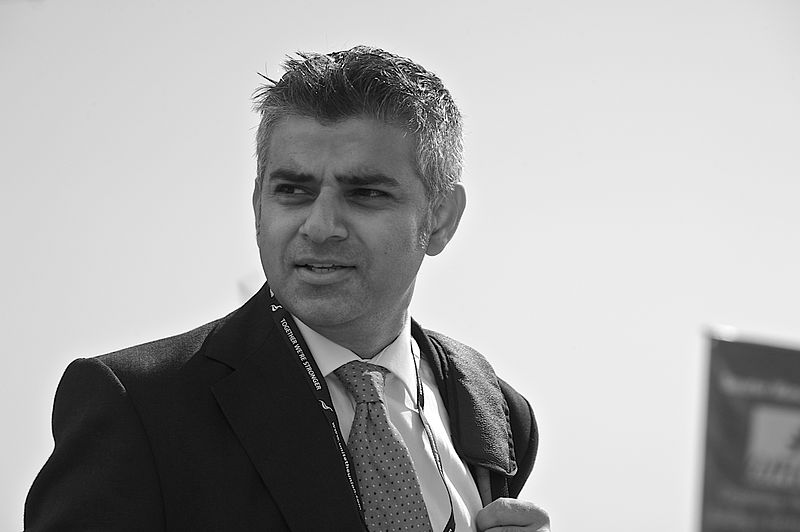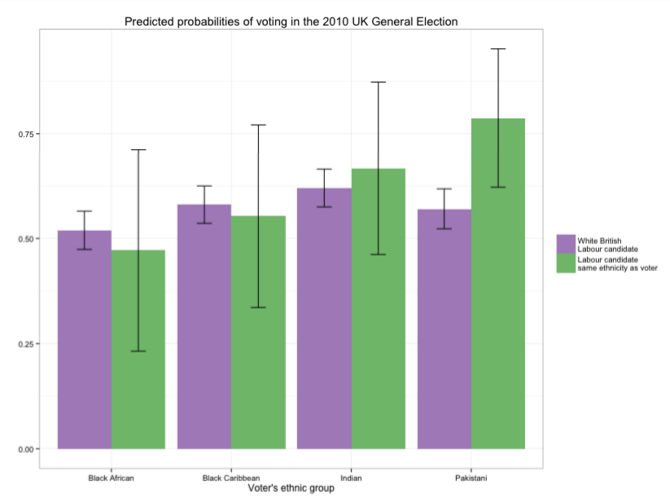Do ethnic minority candidates mobilise ethnic minority voters? Mostly not.
All major political parties in the UK have made efforts to increase the number of ethnic minority candidates that stand under their label for election, with Labour’s Sadiq Khan aiming to be become the first Muslim Mayor of London after May of this year. Here, Nicole Martin argues that the idea that ethnic minority candidates mobilise ethnic minority voters in great number isn’t necessarily borne out by the evidence.

Sadiq Khan, Labour’s candidate for Mayor of London Credit (Credit: Steve Punter, CC BY SA 2.0)
There were more ethnic minority candidates than ever in the 2015 UK general election, but we don’t know what effect the ethnicity of these candidates had on the behaviour of electors in their constituency. Using data from the 2010 Ethnic Minority British Election Study, I carried out research to see whether ethnic minority turnout is higher when a candidate from the same group stands.
For most ethnic minorities, there is no difference in turnout between voters who lived in a constituency with an MP who shared their ethnic group. The graph below shows the probability of voting among different ethnic groups, firstly in a seat where the Labour candidate was not from the same ethnic group, and then where they were. There are no significant differences for voters who describe themselves as black Caribbean, black African, or Indian, but we can see that Pakistani registered voters are more likely to actually go to the polls if the Labour party candidate is also Pakistani.
How is this happening? I tested three explanations. There is some evidence that descriptive representation can increase institutional trust or satisfaction of an under-represented – by signalling a lack of discrimination, or commitment against discrimination. For instance, support for American courts increases amongst blacks who believe that black judges were over-represented. But this doesn’t explain the increase in turnout we see in the UK – Pakistanis and other minorities were no more likely to be interested in politics, to know more about politics or to feel a greater duty to vote when a candidate from the same ethnic group was standing. So we can rule this out.
Another explanation is that parties try especially hard to win the votes of minorities when a minority candidate is standing – because they think they have a better chance of capturing these votes, or they fear that white voters will discriminate against the minority candidate, and seek to minimise the electoral damage. However, this does not explain the difference in this case.
The explanation that seems likely when we look at the data however is that support for a Pakistani candidate is mobilised through social ties within the Pakistani community. Pakistanis are more likely to vote when a Labour Pakistani candidate is standing only if a family member, a friend or someone from their place of worship had tried to convince them how to vote. This is not the case for other ethnic groups, suggesting that Pakistani candidates from the Labour party enjoy a benefit in terms of turnout if people in the wider Pakistani community exert pressure on other Pakistanis to vote for them.
This result is interesting given that scholars and political actors alike have remarked on the importance of biraderi or kinship networks in British Pakistani politics. This goes back to earlier decades – documents from the Conservative Research Department 1974 advise that ‘many migrant voters still tend to support the person they know more than the party or policy’. But biraderi have hit the headlines in recent years when discussing the fraught politics of candidate selection in Bradford West, and when former Labour MP Shahid Malik complained about the dominance of kinship networks in local politics. The results in this paper do not show that biraderi are responsible for the mobilisation of Pakistani voters when a Pakistani candidate stands for the Labour party. However, they are consistent with the interpretation that within-group social capital plays a role in support for Pakistani candidates.
Of course, ethnic minority candidates can also lose votes on account of their ethnicity. There is strong evidence that minority candidates in the UK face an electoral penalty from discriminatory white voters. But my research suggests that some minorities are also less likely to vote for other minority candidates than a white candidate. The 1997 General Election was a landslide for Labour nationally, but the safe Labour seat of Bradford West saw a Conservative Muslim candidate make strong gains against a Labour Sikh candidate. This seat has a large Muslim population, and this result was attributed to the reluctance of Muslims to vote for a Sikh, instead choosing a fellow Muslim from the Conservative party. In 2010, we can see a similar pattern being replicated over multiple seats, and among both groups; Sikhs were less likely to vote when the Labour party candidate was a Muslim, and Muslims were less likely to vote when there was a Sikh candidate (there were not enough Sikh candidates to test whether the effect was different between parties). This suggests that a long-running social and political conflict that originates in India and Pakistan – Sikhs and Muslims have been in recurring conflicts since the fifteenth century, and much animosity stems from bloodshed and property destruction following partition in 1947 – is being translated into electoral politics in the UK.
Why are we only interested in Labour candidates? Ethnic minorities are overwhelmingly likely to vote for the Labour party (even in 2015). The Conservative party faces difficulties in attracting the support of more than a small proportion of ethnic minority voters. Whilst 80% of black people and 76% of people of South Asian descent think that the Labour party ‘understands minorities’, only 20% and 36%, respectively, think the same of the Conservative party. (Long-standing loyalties to the Labour party imply that candidates from other parties face an uphill battle among minorities – and this is what we see in the results. There are absolutely no significant differences when we look at the effects of candidates from the Conservative party.
So, if most minority candidates don’t mobilise voters who share the same ethnicity, where now for descriptive representation? The most obvious point is that it doesn’t bode well for the Conservative’s attempts to woo ethnic minority voters by selecting more ethnic minority MPs – remember, we only saw increased turnout among Pakistanis when a Pakistani candidate stood for Labour. Nevertheless, ethnic minority MPs in Westminster ask more questions about immigrant, ethnic diversity and equality issues than other MPs.
Somewhat reassuringly, white MPs who represent ethnically diverse constituencies do the same. It is likely that substantive changes in party policy that might come from having more minority MPs could do more to detoxify the Conservative brand among ethnic minorities than any individual candidate. My research has shown that some ethnic groups in the UK have ‘voted with their feet’ when it comes to descriptive representation – but this is not the only way in which parties can mobilise or respond to the concerns of minority voters.
—
This post represents the views of the author and not those of Democratic Audit UK or the LSE. Please read our comments policy before posting.
—
 Dr Nicole Martin is Senior Research Officer, Policy Unit, Institute of Social and Economic Research at the University of Essex
Dr Nicole Martin is Senior Research Officer, Policy Unit, Institute of Social and Economic Research at the University of Essex






 Democratic Audit's core funding is provided by the Joseph Rowntree Charitable Trust. Additional funding is provided by the London School of Economics.
Democratic Audit's core funding is provided by the Joseph Rowntree Charitable Trust. Additional funding is provided by the London School of Economics.
[…] All major political parties in the UK have made efforts to increase the number of ethnic minority candidates that stand under their label for election, with Labour’s Sadiq Khan aiming to be b… […]
Do ethnic minority candidates mobilise ethnic minority voters? Mostly not. https://t.co/BvxsW2iGZt
Do ethnic minority candidates mobilise ethnic minority voters in the UK? Mostly not. https://t.co/flhOWwNC51
Muslim apologist @sunny_hundal should read about Pakistanis not voting for Sikh candidates https://t.co/WwB9llnZcs No comments on bigots?
@Harsarans Voting as a block does matter. Even British noticed this “biraderi” phenomenon in a community https://t.co/bd07KGdyU6
Do ethnic minority candidates mobilise ethnic minority voters? Mostly not – argues @nspmartin https://t.co/pIZkQiHaYb
Do ethnic minority candidates mobilise ethnic minority voters? Mostly not. New blog by @nspmartin @democraticaudit https://t.co/eE7JtCfoan
Ethnic minority candidates don’t mobilise ethnic minority voters #londonmayor2016 | @nspmartin @HubIntegration https://t.co/bQYcVnuhwp
RT @PJDunleavy: Do ethnic minority candidates mobilise ethnic minority voters? Mostly not. https://t.co/flhOWwNC51
[…] Do ethnic minority candidates mobilise ethnic minority voters? Mostly not. All major political parties in the UK have made efforts to increase the number of ethnic minority candidates that stand under their label for election, with Labour's Sadiq Khan aiming to be become the first Muslim Mayor of London after May of this year … Read more on Democratic Audit UK […]
Do ethnic minority candidates mobilise ethnic minority voters? Mostly not. https://t.co/ukAHaYeP8P
Do ethnic minority candidates mobilise ethnic minority voters? Mostly not. https://t.co/5O73E6TwOv https://t.co/syWtMWwUC1